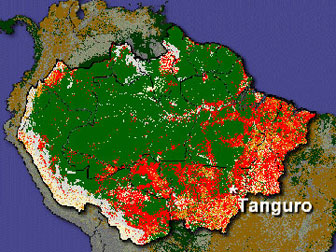Great interview over on Mongabay with Daniel Nepstad, head of the Woods Hole Research Center’s Amazon program. When it comes to immediate carbon emissions reductions, the biggest bang for the buck is to stop deforestation of the tropics. This revelation would have much less relevance if there were not also a mechanism envisioned to achieve it called the RED initiative (Reducing Emissions from Deforestation).
As with anything, the concept has its critics. In my unqualified opinion, one of the biggest potential flies in the ointment is fire. How do you keep a carbon sink from going up in smoke? Once the land becomes more valuable for soy, sugarcane or palm oil, how can you stop the local profiteers from setting the forests on fire, nullifying them as carbon sinks?
Hopefully, the authors of this scheme will do a better job than the bozos (again, no offense to you clowns out there) who put the agrofuel consumption mandates in place that are currently consuming carbon sinks, food, and biodiversity all around the world while simultaneously increasing CO2 emissions.

Hot Pixels, in red, show where fire activity was greatest in 2004 (Mongabay).
Mongabay: In terms of the numbers, are we talking billions of dollars per year?
Nepstad: That’s what would be needed if we are to reach most tropical countries. It is important to remember that there is still a big gap between what the carbon market is paying for a ton of carbon ($10 to $20) and the economic damages to the world economy that are associated with the release of a ton of carbon to the atmosphere (estimated at about $50 – $120 per ton. Meanwhile the number we’re coming up with for the Amazon is something closer to about $5 to prevent a ton of carbon to achieve something like a 70 percent reduction in emissions. It’s amazing how cheap it could be to fight climate change by reducing deforestation.
There’s a striking disconnect between the world’s biggest environmental issue, global warming, and this very low-hanging fruit that could also has a set of very large side benefits. A big question is whether we can navigate the pitfalls that derailed negotiations during the Kyoto round.
Anybody know what we are spending in Iraq every month?

